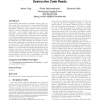Free Online Productivity Tools
i2Speak
i2Symbol
i2OCR
iTex2Img
iWeb2Print
iWeb2Shot
i2Type
iPdf2Split
iPdf2Merge
i2Bopomofo
i2Arabic
i2Style
i2Image
i2PDF
iLatex2Rtf
Sci2ools
66
Voted
CCS
2015
ACM
2015
ACM
Heisenbyte: Thwarting Memory Disclosure Attacks using Destructive Code Reads
Vulnerabilities that disclose executable memory pages enable a new class of powerful code reuse attacks that build the attack payload at runtime. In this work, we present Heisenbyte, a system to protect against memory disclosure attacks. Central to Heisenbyte is the concept of destructive code reads – code is garbled right after it is read. Garbling the code after reading it takes away from the attacker her ability to leverage memory disclosure bugs in both static code and dynamically generated just-in-time code. By leveraging existing virtualization support, Heisenbyte’s novel use of destructive code reads sidesteps the problem of incomplete binary disassembly in binaries, and extends protection to close-sourced COTS binaries, which are two major limitations of prior solutions against memory disclosure vulnerabilities. Our experiments demonstrate that Heisenbyte can tolerate some degree of imperfect static analysis in disassembled binaries, while effectively thwarting dynamic co...
| Added | 17 Apr 2016 |
| Updated | 17 Apr 2016 |
| Type | Journal |
| Year | 2015 |
| Where | CCS |
| Authors | Adrian Tang, Simha Sethumadhavan, Salvatore J. Stolfo |
Comments (0)

